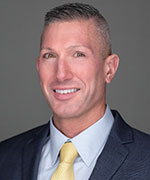Moffitt Program Aims to Reduce Suicide Risk in Patients with Cancer
Warning
This story contains a discussion of suicide, self-harming behavior, and depression and references other mental health disorders that may act as triggers. Continue at your own discretion.
Over the past two weeks, how often have you been bothered by thoughts that you would be better off dead or hurting yourself in some way?
If you’re a healthy adult, that answer might be never. For some people with cancer, however, sometimes the answers aren’t so easy.
A new pilot program at Moffitt Cancer Center has been in the works since 2016. Its goal is to identify patients who experience emotional suffering and quickly get them the help that they need.
“As we delved into the literature, we were seeing more and more silent suffering of people with cancer,” said Sean Powell, director of Social Work and Patient Support Services at Moffitt. “People were having depressive symptoms and not talking about it. We put together a plan to address these thoughts.”

Sean Powell, Director of Social Work and Patient Support Services
In February 2021, the pilot program officially launched in Moffitt’s Head and Neck, Radiation Oncology, Supportive Care and Behavioral Medicine clinics. Patients are given a tablet and asked to answer a modified version of the Edmonton Symptom Assessment System, a questionnaire used to rate the intensity of nine common symptoms experienced by patients with cancer. This modified scale is called the Patient Reported Symptoms and Assessment, or PRSA.
In this version, patients are asked questions that pertain specifically to their mental health and psychosocial distress.
“The first few weeks were a bit shocking,” said Powell. “We were getting eight to 10 patients a week, sometimes 15 saying they thought they would be better off dead.”
When a patient indicates they have had thoughts that they would be better off dead, a notification is sent to Moffitt’s social work office and a licensed social worker is sent to assess that patient. The assessment takes place in a private setting and family members or other caregivers are encouraged to participate.
“What our social workers have found was that the vast majority of patients didn’t want to die by suicide, but they wanted to be dead because the suffering that they were experiencing was extreme,” said Donna DiClementi, manager of Outpatient Social Work at Moffitt. “Sometimes that suffering was due to pain, fatigue or not wanting to be a burden to their family anymore. The ability to talk to them about what was behind their answers really led to a lot of great opportunities to get people help that we wouldn’t have otherwise identified.”
The American Society of Clinical Oncology recommends all cancer patients 18 and older be routinely evaluated for depression and anxiety during their cancer journey. Failure to identify and treat depression and anxiety can increase the risk of poor quality of life and potentially increase disease-related morbidity and mortality.
“Historically, anything behavioral health or suicide related has been considered taboo or uncomfortable for medical providers to discuss,” said Powell. “What we wanted to do was normalize the conversation. When the patients are reporting it and doctors are seeing it, we want people to realize they don’t need to be afraid of these conversations as part of the cancer diagnosis and treatment.”
Moffitt’s Head and Neck clinic was chosen as one of the pilot clinics because treatment for those types of cancers can leave patients with permanent changes to the way they look or sound and can even impact their ability to communicate.
Dr. Caitlin McMullen, a surgeon in Moffitt’s Head and Neck Oncology Program, has seen the effects up close.

Dr. Caitlin McMullen, Head and Neck Oncology Program
“Head and neck cancer can be a devastating disease with significant effects on a patient’s quality of life,” said McMullen. “Studies have shown that patients with head and neck cancers have a suicide rate that is twice as high as with other cancers. Here at Moffitt, we understand these issues and care for the whole patient. There are interventions and resources available to help and this program helps us to identify patients who may benefit.”
The question remains, has the pilot program shown success in preventing death by suicide?
“I have no doubt,” said DiClementi.
“I can think of more than a few cases off the top of my head,” said Powell. “In each of these situations we were able to get them transitioned immediately into behavioral health care. For those with a seed planted where there was suffering, with some hopelessness fertilizing that suffering, we were able to intervene and pull them out of that and get them connected with resources and the help that they needed to regain their resiliency.”
If you are in crisis, call the toll-free National Suicide Prevention Lifeline at 1-800-273-TALK (8255). The service is available 24 hours a day, seven days a week. All calls are confidential. You can also contact the Crisis Text Line, a texting service for emotional crisis support. To speak with a trained listener, text HELLO to 741741. It is free, available 24/7 and confidential.



